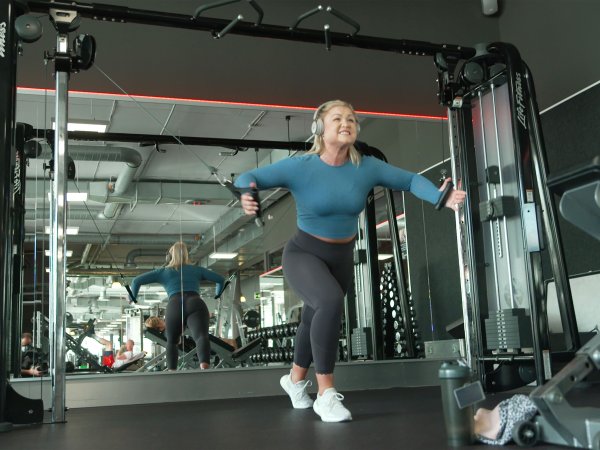In 2012, Sophia Thiel starved herself from a body weight of 80 kilograms down to 50 kilograms - at a height of 1.72 meters. She starts bodybuilding, and the vicious cycle of "train, eat, sleep" picks up speed. "I always thought my body was an asshole, I had to beat it." The then 17-year-old builds up a huge social media community, lets her followers share in her life trimmed to fitness.
In 2019, suddenly nothing works anymore. For two years, the now 27-year-old completely disappears. Then in 2021, the comeback - including the publication of her book "Come back stronger" (published by ZS Verlag) - with significantly more kilograms on the ribs. Thiel now speaks openly about her eating disorder. And even today, she regularly struggles with binge eating. "My body, the diets and me. I've done a lot of shenanigans with myself behind the scenes in the past and I'm more than grateful for the development since my break." The fitness influencer also tells in the ZDF report "37 degrees" how bad she was at times and how destructive she was with her body.
In her book, she writes about her personal experiences, insights and dealing with her eating disorder. She hopes "that I can perhaps offer a helping hand to many people out there. It took her a long time to realize that she wasn't perfect or had to live up to any ideals. "Accepting yourself is sometimes not so easy," she admits openly. But she says the path to finding herself is worth taking. That's why she now regularly asks herself questions - about her own self-image, the future, everyday life and, above all, "This is good for me." She has also discovered ice bathing for herself - as a kind of meditation.
While the focus in professional sports is more on the clinical pictures of anorexia, bulimia and binge eating, the general population is struggling with too much weight. According to the latest RKI figures, 53.5 percent of the population in Germany is overweight (including obesity). Men (around 61 percent) top women (around 47 percent) here. Obesity is present in 19 percent of adults. This is also confirmed by Dr. Silja Schäfer of the Nutrition Docs. "We see that the extremes are increasing. Accordingly, all eating disorders are increasing." Especially among young people, the problem is "really frightening." And among those over 60, the nutrition doctor observes that about 70 percent are overweight. The current book of the nourishing Docs dedicates itself also to this topic ?our anti-belly fat program ?(published in the ZS publishing house).

In general, the so-called body mass index of the WHO (World Health Organization) makes a statement about the weight in the normal range. Some calculators extend the simple formula (body weight divided by height in meters squared) to include gender and age.
Reason: From 40 it is quite normal to gain weight, but this does not mean that the weight is outside the norm. Another criticism of the BMI is that only the body mass is considered, and not the ratio between fat and muscle mass. For those who do a lot of sports and have thus built up muscles can even have a BMI above 25 and thus be classified as overweight according to the definition. For this reason, Dr. Schäfer recommends a BIA measurement (Bioelectrical Impedance Analysis). This shows "exactly the body composition" in terms of muscles, body fat deposits and also water, among other things.
According to the Forbes experts the following diets will be in vogue in 2023: the Mediterranean diet with fresh fruit, whole grains, nuts, vegetables, fish and olive oil. In second place is a vegetarian diet followed by the DASH diet (cereals, Meat, poultry, fish, fruits and vegetables). The DASH diet, developed on scientific evidence, is designed to reduce high blood pressure. The abbreviation DASH stands for "dietary approach to stop high pressure".

As the best commercial diet, Weight Watchers comes in fourth, and the app Noom in fifth. Noom, according to Forbes expert Dr. Melina Jampolis, "is not a diet, but rather a lifestyle for greater sustainability. The program is based on behavior change, which is a key element to successful and lasting weight loss - it tries to go beyond just calorie intake and output (exercise) and help individuals understand why they overeat or make poor choices."
However, not only overweight and obesity are on the rise in industrialized countries, but also eating disorders such as anorexia nervosa (anorexia) and bulimia nervosa (binge eating disorder) as well as binge eating disorder. The deliberate reduction of body weight to the limit of underweight in order to achieve a certain athletic performance and to gain recognition is referred to as anorexia athletica (perhaps pseudoanorexia athletica would be better), according to the "Deutsche Ärzteblatt".
The cliché that mainly girls or models suffer from disorders such as anorexia or bulimia is not true, according to findings of the German health insurance company Barmer. Its own projections show a significant increase in eating disorders among men and women of 13 percent within four years.
In addition, various studies with U.S. students would indicate that there are hardly (yet) any differences between men and women in terms of frequency. If the symptoms of an eating disorder, such as self-induced vomiting, binge eating, use of laxatives or excessive exercise, were considered, another study came to the surprising conclusion: among adolescents, these disorders are equally common among boys and girls.

Almost every second patient with an eating disorder, according to Professor Dr. Almut Zeeck, Senior Physician at the Clinic for Psychosomatic Medicine and Psychotherapy of the University Hospital in Freiburg, does sport in a problematic way. Whether running, cycling or swimming: Patients suffering from anorexia or bulimia would use sports to specifically influence their weight or figure. "They have a strict plan in mind and become very restless if, for example, they don't have the opportunity to go for a run for an hour before breakfast," says the senior physician.
However, she adds, athletic activity becomes problematic not only when it is done excessively, but also when patients* feel guilty when they can't exercise. Other warning signs: Those who can't stop exercising despite injury or illness. Those affected often do not allow their bodies a break and time to regenerate after training. Motives would also play a role: Those who no longer enjoy exercise, but only try to consume the supposedly many calories through daily sports.

For many top athletes, the issue of weight is often a balancing act between competitive disadvantages due to a too high weight and performance losses due to a too low weight. "In some sports disciplines, such as track and field, ski flying, and to some extent in martial arts and aesthetic sports, a body weight as low as possible is presumably required," says Dr. Christine Kopp, senior physician at the Tübingen Sports Medicine Department and association physician of the German Athletics Association. Because of the problem, the physician has initiated a consultation hour for female competitive athletes in 2019. This is the point of contact for female athletes from all over Germany who have too low a body weight or noticeable symptoms such as a drop in performance, hormone disorders or fatigue fractures.
Germany's best runner, Konstanze Klosterhalfen, regularly faces accusations that she is too thin. At 1.74 meters tall, she weighs just 48 kilograms. That corresponds to a body mass index of 15.85. According to the Federal Center for Nutrition, a BMI below 18.5 means being underweight. However, in various interviews the 25-year-old track and field athlete emphasizes how important healthy nutrition is to her and that she is constantly optimizing it.
Nutrition doc Schäfer knows the weight issues in athletics. "Coaches come to me looking for help. My advice then is to address the issue clearly and say where the coach's work stops and psychological support would be important." But the nutritionist also openly admits, "When it comes to eating disordered children, we are often helpless and don't know when to intervene." That's why, in her own words, she thinks it's "good" when well-known athletes like Sophia Thiel, for example, publicize the issue of eating disorders.
Under the hashtag Body Positivity, more and more women and men are daring to present their "imperfect" bodies. However, in this context, various medical experts warn of the negative consequences of being overweight. In a study from 2018 Austrian and English scientists established precisely this connection: more and more people are overweight but do not perceive this as negative or harmful to their health. Dr. Schäfer, a mother herself, recommends picking out the "good aspects" of social media, always questioning the content and "not just following someone just because."
- more vegetables: proportion of at least 50 percent per meal
- more protein: one food with a protein component at every meal
- fewer carbohydrates - but this always depends on how much you exercise or "work up".
- drink more: 30 to 35 milliliters per kilogram of body weight throughout the day
- Think about your diet (regional/seasonal/organic products) and lifestyle.
- Have your family doctor do a meaningful blood count (including minerals, fats, proteins, vitamins).
- Take advantage of nutritional counseling
- ISPO awards
- Mountain sports
- Bike
- Design
- Retail
- Fitness
- Health
- ISPO Job Market
- ISPO Munich
- ISPO Shanghai
- Running
- Brands
- Sustainability
- Olympia
- OutDoor
- Promotion
- Sports Business
- ISPO Textrends
- Triathlon
- Water sports
- Winter sports
- eSports
- SportsTech
- OutDoor by ISPO
- Heroes
- Transformation
- Sport Fashion
- Urban Culture
- Challenges of a CEO
- Trade fairs
- Sports
- Find the Balance
- Product reviews
- Newsletter Exclusive Area
- Magazine




